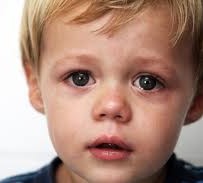Anxiety in Children

Anxiety, just as any other emotion, is closely related to the fear that everyone experiences. Children experience various states of fear or anxiety since the time they are born. The way they react to it depends on their age, personality, genetics and copying skills. They can get afraid of insects, dark, ghosts, dogs, etc and as the child grows up such fears diminish. It becomes a matter of concern only when the child stops doing their normal activities owing to these fears, and needs to be treated accordingly to overcome the same.
Anxiety in infants/toddlers: Infants can seem very irritable, restless, and sleepless in panicky situations. Children clinging excessively to their caretaker, constantly crying, throwing tantrums /restless, do not sleep through the night or alone and pass frequent urinations indicate anxious behaviour.
Anxiety in these children can be gradually reduced by exposing them to a wide range of experiences, meeting many people outside home and made to play with other children. They can be asked to make their own decision and trained to fall asleep on their own by setting a regular bed time routine. Over-stressed parents pass on their stress to their children so it is important to maintain an amicable environment at home.
Anxiety in school age children: Signs of anxiety include being shy, timid, clinging to parents, having difficulty mixing with other children, poor memory/concentration, withdrawal, pessimism and constantly complaining of headaches or stomach aches. These children are irritable and demanding and need a lot of patience to be dealt with. It is very important to be assertive with the child and calm him or her about the things that they worry about and provide reassurance whenever possible.
Anxiety in teenagers: Teens as they undergo physical, hormonal, emotional changes exhibit stress by over eating, under-eating, excessive sleeping, being overly concerned about their appearance, and defiance of authority. Adolescents must be set reasonable ground rules but must not be very restricted; they must be encouraged to share their worries so they confide them.
Reasons for anxiety:
Conflicts or Changes in the family: A parental row, divorce or parental illness can be very distressing for children and they can start assuming guilt for such mishaps in their family. Excessively controlling parents or extremely liberal ones can also pave the wave for stress for the child.
Physical illness or disabilities such as severe asthma attacks or reactions from other children on their disability can make the child upset, self-conscious and depressed.
Tight schedules: Overly packed activities for the child per day may have the child stressed, depriving the child of some downtime to himself every once in a while.
Reasons at school: Bullying, teasing, name calling by other children, reprimanding/unfair teachers, and over burdening school work can make the child depressed, lack self confidence, lose interest and feel resentful.
Other fears/phobias: Exposure to any terrible incident news, violent or horror movie, upsetting scenes or gory books can make the child develop fears.
Owing to their bad past experiences, some children start to develop a fear of social gathering (social phobia), schools, open spaces (Agoraphobia), obsessions and in extreme cases of depression may even inflict self pain or even suicide.

How to avoid anxiety:
Communication, Comfort and Care are the key factors to help the child express their fears, feel safe, loved and cared with the reassurance provided
Parents can show their support and care by physically hugging/holding/cuddling/rocking their child/infant and emotionally soothe them through comforting/reassuring words after allowing the child to express themselves freely about all their worries and fears.
Parents can also help the child solve the problems instead of fixing them for them. They can encourage brave behavior in a feared situation, discourage negative/unhelpful thoughts, support and respect their feelings when it matters the most to them. They must seek medical help if the fears/phobias are overwhelming and prevent the child from continuing their normal activities.

